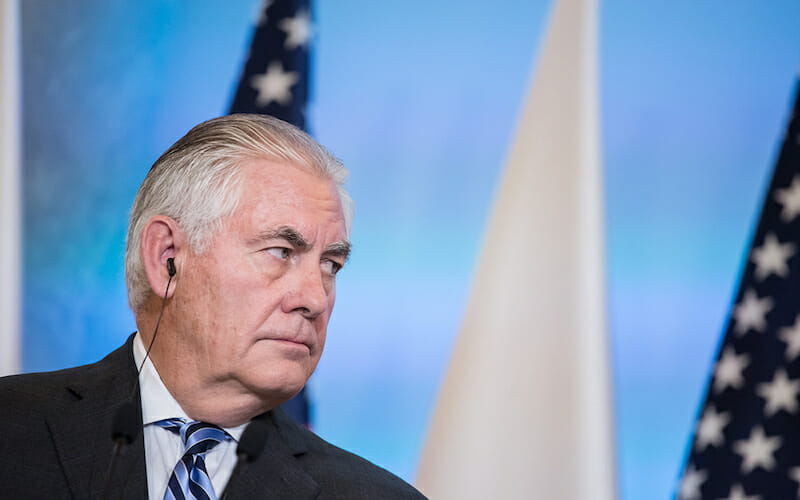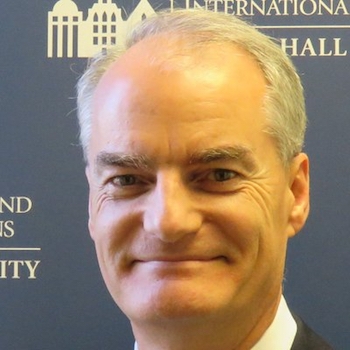
Tillerson Didn’t Manage Russia, or His Boss
Rex Tillerson has been in the morgue for over six months. When I say morgue, I refer to the place where journalists store their draft obituaries on the rich and powerful, putting them on ice until the actual death occurs. Being quick to publish requires it – especially when the person in question is quick to perish.
But Mr. Tillerson was slow toward a career death that was self-inflicted. Like a smoker, he committed suicide on the installment plan. As irritating and bothersome as a chain-smoker in a public place, his personal and political differences with the President fired up with regularity, and often on camera. And finally, the President had to clear the air and call it off limits. Like most tobacco-addicts irritated by “moronics,” Mr. Tillerson refused to take the hints. He succumbed suddenly to the stroke of a blindsiding tweet.
Was Mr. Tillerson a wrong fit from the start, or did it happen over time? Incumbent Trump did not have a television season of thirteen weeks to hire his “apprentice” Secretary of State. As the most senior member of the cabinet, “SecState” is fourth in line of succession to the presidency, and the most senior non-elected official in the federal government. Its face needs to vibe with the people’s choice in the Oval Office.
In his search, I believe President Trump looked for a relationship manager above all else. His Secretary of State would prep the deals, maintain interest, and arrange the President for the “closing.” Secretary Tillerson would be the adult in the room with troublesome world characters who understood the grit of business, resources and power. Mr. Tillerson’s rolodex groaned under the names of titans of industry and foreign heads of state such as Vladimir Putin. Mr. Tillerson would manage the testy relationship with Russia like no other, thought President Trump.
This well-developed Tillerson-Putin relationship was the selling point in the Secretary of State’s confirmation process. But instead of running the coach’s play and bringing the squad to the end zone, Mr. Tillerson played a middling defensive game of attrition that President Trump couldn’t watch anymore.
Over the prior fourteen months, Russian bedevilments increased, pitchforking the White House and the US electorate this past year to distraction: all part of Mr. Putin’s ongoing “hybrid-warfare” to undermine American resolve in the world. Mr. Tillerson was as missing-in-action as his Russian-recusing co-captain Attorney General Jeff Sessions. Was he on the team or not?
So, coincidentally on the same day UK Prime Minister Theresa May expelled twenty-five Russian diplomats for Soviet-style treachery, the President expelled his top diplomat Mr. Tillerson for not being Moscow-oriented enough, for having failed to check Russian’s unrelenting offensive in international affairs.
Mr. Tillerson in fact had little beyond his “relationship guy” appeal to qualify him as a statesman – someone who represents to the world above one’s domestic politics.
Mr. Tillerson never experienced public accountability in the political world. Not a household name, Tillerson nonetheless was one of the biggest bureaucrats in America (yes, the private sector, too, is run by bureaucrats).
He lived his entire career in only one corporate culture where he defaulted to a top-down management approach that had served him as Mobil Oil’s CEO for years – the only employer he had ever known.
And just as “deep state” power-wielders in Washington habitually do, Mr. Tillerson assumed a prerogative that instead rightly belongs to voters and shareholders.
Like so many management-class employees who depend upon anonymity to authorize to themselves outsized salaries, private jets, and bigger-than-thou egos, he settled naturally among the deep state mentality within the deep State Department – to include levelling the boss in public.
Secretary Tillerson tried to appear otherwise by whacking the Department’s organizational charts and office suite silos – the private sector version of saying there’s a new sheriff in town.
But doing so in that unfamiliar world marred his chances of becoming a Captain Kirk in a universe requiring much more than the Lone Ranger.
So perhaps Trump’s choice was poor – recruiting a relationship guy, more “quarterly statements” than statesman, unaware of coach class, and traipsing to Washington with baggage beyond his one free carry-on.
CEOs come and go all the time, and don’t worry, they always land on their feet.

